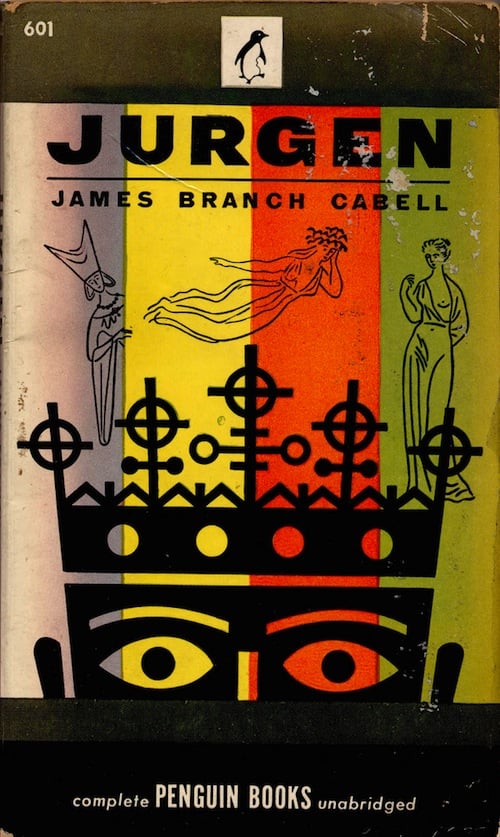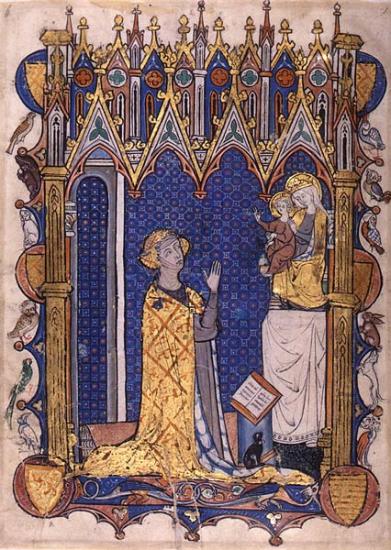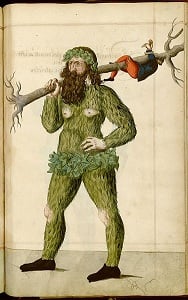Jurgen (13)
By:
June 7, 2015

James Branch Cabell’s 1919 ironic fantasy novel Jurgen, A Comedy of Justice, the protagonist of which seduces women everywhere he travels — including into Arthurian legend and Hell itself — is (according to Aleister Crowley) one of the “epoch-making masterpieces of philosophy.” Cabell’s sardonic inversion of romantic fantasy was postmodernist avant la lettre. HiLoBooks is pleased to serialize Jurgen here at HILOBROW. Enjoy!
Now Jurgen, self-appointed Duke of Logreus, abode at the court of King Gogyrvan. The month of May passed quickly and pleasantly: but the monstrous shadow which followed Jurgen did not pass. Still, no one noticed it: that was the main thing. For himself, he was not afraid of shadows, and the queerness of this one was not enough to distract his thoughts from Guenevere, nor from his love-making with Guenevere.
For these were quiet times in Glathion, now that the war with Rience of Northgalis was satisfactorily ended: and love-making was now everywhere in vogue. By way of diversion, gentlemen hunted and fished and rode a-hawking and amicably slashed and battered one another in tournaments: but their really serious pursuit was lovemaking, after the manner of chivalrous persons, who knew that the King’s trumpets would presently be summoning them into less softly furnished fields of action, from one or another of which they would return feet foremost on a bier. So Jurgen sighed and warbled and made eyes with many excellent fighting-men: and the Princess listened with many other ladies whose hearts were not of flint. And Gogyrvan meditated.

Now it was the kingly custom of Gogyrvan when his dinner was spread at noontide, not to go to meat until all such as demanded justice from him had been furnished with a champion to redress the wrong. One day as the gaunt old King sat thus in his main hall, upon a seat of green rushes covered with yellow satin, and with a cushion of yellow satin under his elbow, and with his barons ranged about him according to their degrees, a damsel came with a very heart-rending tale of the oppression that was on her.
Gogyrvan blinked at her, and nodded. “You are the handsomest woman I have seen in a long while,” says he, irrelevantly. “You are a woman I have waited for. Duke Jurgen of Logreus will undertake this adventure.”
There being no help for it, Jurgen rode off with this Dame Yolande, not very well pleased: but as they rode he jested with her. And so, with much laughter by the way, Yolande conducted him to the Green Castle, of which she had been dispossessed by Graemagog, a most formidable giant.
“Now prepare to meet your death, sir knight!” cried Graemagog, laughing horribly, and brandishing his club; “for all knights who come hither I have sworn to slay.”
“Well, if truth-telling were a sin you would be a very virtuous giant,” says Jurgen, and he flourished Thragnar’s sword, resistless Caliburn.
Then they fought, and Jurgen killed Graemagog. Thus was the Green Castle restored to Dame Yolande, and the maidens who attended her aforetime were duly released from the cellarage. They were now maidens by courtesy only, but so tender is the heart of women that they all wept over Graemagog.

Yolande was very grateful, and proffered every manner of reward.
“But, no, I will take none of these fine jewels, nor money, nor lands either,” says Jurgen. “For Logreus, I must tell you, is a fairly well-to-do duchy, and the killing of giants is by way of being my favorite pastime. He is well paid that is well satisfied. Yet if you must reward me for such a little service, do you swear to do what you can to get me the love of my lady, and that will suffice.”
Yolande, without any particular enthusiasm, consented to attempt this: and indeed Yolande, at Jurgen’s request, made oath upon the Four Evangelists that she would do everything within her power to aid him.
“Very well,” said Jurgen, “you have sworn, and it is you whom I love.”
Surprise now made her lovely. Yolande was frankly delighted at the thought of marrying the young Duke of Logreus, and offered to send for a priest at once.
“My dear,” says Jurgen, “there is no need to bother a priest about our private affairs.”
She took his meaning, and sighed. “Now I regret,” said she, “that I made so solemn an oath. Your trick was unfair.”
“Oh, not at all,” said Jurgen: “and presently you will not regret it. For indeed the game is well worth the candle.”
“How is that shown, Messire de Logreus?”
“Why, by candle-light,” says Jurgen, — “naturally.”
“In that event, we will talk no further of it until this evening.”
So that evening Yolande sent for him. She was, as Gogyrvan had said, a remarkably handsome woman, sleek and sumptuous and crowned with a wealth of copper-colored hair. To-night she was at her best in a tunic of shimmering blue, with a surcote of gold embroidery, and with gold embroidered pendent sleeves that touched the floor. Thus she was when Jurgen came to her.
“Now,” says Yolande, frowning, “you may as well come out straightforwardly with what you were hinting at this morning.”
But first Jurgen looked about the apartment, and it was lighted by a tall gilt stand whereon burned candles.
He counted these, and he whistled. “Seven candles! upon my word, sweetheart, you do me great honor, for this is a veritable illumination. To think of it, now, that you should honor me, as people do saints, with seven candles! Well, I am only mortal, but none the less I am Jurgen, and I shall endeavor to repay this sevenfold courtesy without discount.”

“Oh, Messire de Logreus,” cried Dame Yolande, “but what incomprehensible nonsense you talk! You misinterpret matters, for I can assure you I had nothing of that sort in mind. Besides, I do not know what you are talking about.”
“Indeed, I must warn you that my actions often speak more unmistakably than my words. It is what learned persons term an idiosyncrasy.”
“— And I certainly do not see how any of the saints can be concerned in this. If you had said the Four Evangelists now — ! For we were talking of the Four Evangelists, you remember, this morning — Oh, but how stupid it is of you, Messire de Logreus, to stand there grinning and looking at me in a way that makes me blush!”
“Well, that is easily remedied,” said Jurgen, as he blew out the candles, “since women do not blush in the dark.”
“What do you plan, Messire de Logreus?”
“Ah, do not be alarmed!” said Jurgen. “I shall deal fairly with you.”
And in fact Yolande confessed afterward that, considering everything, Messire de Logreus was very generous. Jurgen confessed nothing: and as the room was profoundly dark nobody else can speak with authority as to what happened there. It suffices that the Duke of Logreus and the Lady of the Green Castle parted later on the most friendly terms.
“You have undone me, with your games and your candles and your scrupulous returning of courtesies,” said Yolande, and yawned, for she was sleepy; “but I fear that I do not hate you as much as I ought to.”
“No woman ever does,” says Jurgen, “at this hour.” He called for breakfast, then kissed Yolande — for this, as Jurgen had said, was their hour of parting, —and he rode away from the Green Castle in high spirits.
“Why, what a thing it is again to be a fine young fellow!” said Jurgen. “Well, even though her big brown eyes protrude too much — something like a lobster’s — she is a splendid woman, that Dame Yolande: and it is a comfort to reflect I have seen justice was done her.”
Then he rode back to Cameliard, singing with delight in the thought that he was riding toward the Princess Guenevere, whom he loved with his whole heart.
Footnotes from Notes on Jurgen (1928), by James P. Cover — with additional comments from the creators of this website; rewritten, in some instances, by HiLoBooks.
* Rience of Northgalis — King Rience of North Wales was among Arthur’s chief foes. One of Arthur’s first acts was to drive him out of Cameliard, which he was ravaging, and so win Guenevere, the daughter of the grateful king of that country. Later Rience, having conquered eleven kings and used their beards with which to embroider his mantle, insultingly demanded Arthur’s beard to complete this unique piece of fancy work.
* Graemagog — Possibly a variation on Gogmagog, a fictional giant of British history.
* Jurgen’s reward — It appears that Jurgen was by no means original in the trick he played upon Yolande. Malory, in Book IV, Chapter XXII, of Le Morte d’Arthur, relates, “Will ye, said Sir Gawaine, promise me to do all that ye may, by the faith of your body, to get me the love of my lady? Yea, sir, said she, and that I promise by the faith of my body. Now, said Sir Gawaine, it is yourself that I love so well, therefore I pray you hold your promise. I may not choose, said the Lady Ettard, but if I should be foresworn; and so she granted him to fulfill all his desire.”
RADIUM AGE SCIENCE FICTION: “Radium Age” is HILOBROW’s name for the 1904–33 era, which saw the discovery of radioactivity, the revelation that matter itself is constantly in movement — a fitting metaphor for the first decades of the 20th century, during which old scientific, religious, political, and social certainties were shattered. This era also saw the publication of genre-shattering writing by Edgar Rice Burroughs, Sax Rohmer, E.E. “Doc” Smith, Jack London, Arthur Conan Doyle, Aldous Huxley, Olaf Stapledon, Karel Čapek, H.P. Lovecraft, Charlotte Perkins Gilman, Yevgeny Zamyatin, Philip Gordon Wylie, and other pioneers of post-Verne/Wells, pre-Golden Age “science fiction.” More info here.
READ GORGEOUS PAPERBACKS: HiLoBooks has reissued the following 10 obscure but amazing Radium Age science fiction novels in beautiful print editions: Jack London’s The Scarlet Plague, Rudyard Kipling’s With the Night Mail (and “As Easy as A.B.C.”), Arthur Conan Doyle’s The Poison Belt, H. Rider Haggard’s When the World Shook, Edward Shanks’ The People of the Ruins, William Hope Hodgson’s The Night Land, J.D. Beresford’s Goslings, E.V. Odle’s The Clockwork Man, Cicely Hamilton’s Theodore Savage, and Muriel Jaeger’s The Man with Six Senses. For more information, visit the HiLoBooks homepage.
SERIALIZED BY HILOBOOKS: Jack London’s The Scarlet Plague | Rudyard Kipling’s With the Night Mail (and “As Easy as A.B.C.”) | Arthur Conan Doyle’s The Poison Belt | H. Rider Haggard’s When the World Shook | Edward Shanks’ The People of the Ruins | William Hope Hodgson’s The Night Land | J.D. Beresford’s Goslings | E.V. Odle’s The Clockwork Man | Cicely Hamilton’s Theodore Savage | Muriel Jaeger’s The Man With Six Senses | Jack London’s “The Red One” | Philip Francis Nowlan’s Armageddon 2419 A.D. | Homer Eon Flint’s The Devolutionist | W.E.B. DuBois’s “The Comet” | Edgar Rice Burroughs’s The Moon Men | Charlotte Perkins Gilman’s Herland | Sax Rohmer’s “The Zayat Kiss” | Eimar O’Duffy’s King Goshawk and the Birds | Frances Hodgson Burnett’s The Lost Prince | Morley Roberts’s The Fugitives | Helen MacInnes’s The Unconquerable | Geoffrey Household’s Watcher in the Shadows | William Haggard’s The High Wire | Hammond Innes’s Air Bridge | James Branch Cabell’s Jurgen | John Buchan’s “No Man’s Land” | John Russell’s “The Fourth Man” | E.M. Forster’s “The Machine Stops” | John Buchan’s Huntingtower | Arthur Conan Doyle’s When the World Screamed | Victor Bridges’ A Rogue By Compulsion | Jack London’s The Iron Heel | H. De Vere Stacpoole’s The Man Who Lost Himself | P.G. Wodehouse’s Leave It to Psmith | Richard Connell’s “The Most Dangerous Game” | Houdini and Lovecraft’s “Imprisoned with the Pharaohs” | Arthur Conan Doyle’s “The Sussex Vampire.”
ORIGINAL FICTION: HILOBROW has serialized three novels: James Parker’s The Ballad of Cocky The Fox (“a proof-of-concept that serialization can work on the Internet” — The Atlantic); Karinne Keithley Syers’s Linda Linda Linda (which includes original music); and Robert Waldron’s roman à clef The School on the Fens. We also publish original stories and comics. These include: Matthew Battles’s stories “Gita Nova“, “Makes the Man,” “Imago,” “Camera Lucida,” “A Simple Message”, “Children of the Volcano”, “The Gnomon”, “Billable Memories”, “For Provisional Description of Superficial Features”, “The Dogs in the Trees”, “The Sovereignties of Invention”, and “Survivor: The Island of Dr. Moreau”; several of these later appeared in the collection The Sovereignties of Invention | Peggy Nelson’s “Mood Indigo“, “Top Kill Fail“, and “Mercerism” | Annalee Newitz’s “The Great Oxygen Race” | Flourish Klink’s Star Trek fanfic “Conference Comms” | Charlie Mitchell’s “A Fantasy Land” | Charlie Mitchell’s “Sentinels” | Joshua Glenn’s “The Lawless One”, and the mashup story “Zarathustra vs. Swamp Thing” | Adam McGovern and Paolo Leandri’s Idoru Jones comics | John Holbo’s “Sugarplum Squeampunk” | “Another Corporate Death” (1) and “Another Corporate Death” (2) by Mike Fleisch | Kathryn Kuitenbrouwer and Frank Fiorentino’s graphic novel “The Song of Otto” (excerpt) | John Holbo’s graphic novel On Beyond Zarathustra (excerpt) | “Manoj” and “Josh” by Vijay Balakrishnan | “Verge” by Chris Rossi, and his audio novel Low Priority Hero | EPIC WINS: THE ILIAD (1.408-415) by Flourish Klink | EPIC WINS: THE KALEVALA (3.1-278) by James Parker | EPIC WINS: THE ARGONAUTICA (2.815-834) by Joshua Glenn | EPIC WINS: THE MYTH OF THE ELK by Matthew Battles | TROUBLED SUPERHUMAN CONTEST: Charles Pappas, “The Law” | CATASTROPHE CONTEST: Timothy Raymond, “Hem and the Flood” | TELEPATHY CONTEST: Rachel Ellis Adams, “Fatima, Can You Hear Me?” | OIL SPILL CONTEST: A.E. Smith, “Sound Thinking | LITTLE NEMO CAPTION CONTEST: Joe Lyons, “Necronomicon” | SPOOKY-KOOKY CONTEST: Tucker Cummings, “Well Marbled” | INVENT-A-HERO CONTEST: TG Gibbon, “The Firefly” | FANFICTION CONTEST: Lyette Mercier’s “Sex and the Single Superhero”
